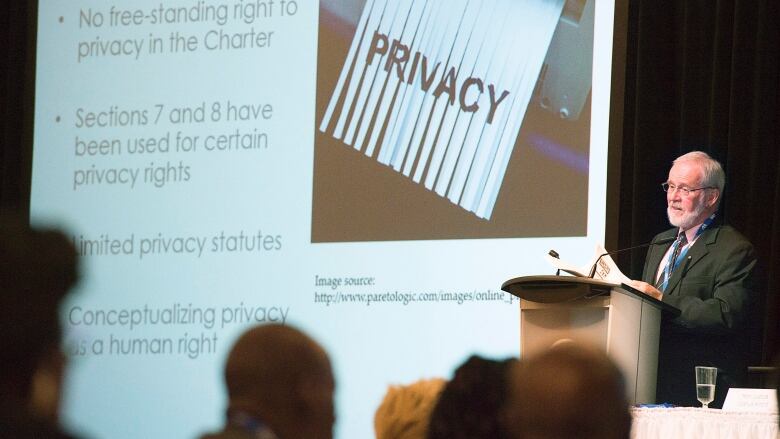Cyberbullying laws needed that allow for non-criminal solutions: professor
Victims face either a complicated police investigation or pricey civil court action

Canada needs cyberbullying laws that curb unwantedsharing of sexual pictures without always requiring police
investigations, a law professor said Tuesday.
Nova Scotia had a Cyber Safety Act the first in Canada fromthe fall of 2013 until the legislation was struck down by theSupreme Court of Nova Scotia near the end of 2015, when a judgeruled that it infringed on charter rights of freedom of expression.
During a meeting of the International Society for the Reform ofCriminal Law in Halifax Wednesday, several experts said thatsincethelawwasstruckdown,victimsofonlineharassmenthavetoturneithertocomplicatedpolice
investigations or expensive civil courtsuits.
'Some degree of urgency'
Wayne MacKay, who teaches human rights law at DalhousieUniversity, said in an interview he's eager for the province tofollow up on a promise to amend and reintroduce its cyberbullyinglaw and bring an investigative unit back into action.
He says the new law should allow for informal requests to swiftlytake down offensive words and images, and allow for civil courtactions that would hold people accountable for distributing intimateimages.
"I think there's some degree of urgency," said the former chairof the Nova Scotia Task Force on Bullying and Cyberbullying, duringan interview after a seminar at the conference."We're allowing people to get back into bad old habits."
820 investigations over 2 years
Roger Merrick, the director of public safety investigations withthe province's Justice Department, said in an interview there is nofirm timeline for the amended legislation, but a legal team isworking to have it ready "as quickly as possible."
During the conference he provided statistics indicating thatthere were about 820 investigations by the CyberScan unit over thetwo years before the law was struck down, and in over 100 casesthere were informal resolutions to the problem.
"We could resolve the complaint informally without having to goto court. That's the benefit of the civil law," he said.
'There's certainly a gap'
He said in 13 cases the unit went to court seeking orders againstonline harassment.
"There's certainly a gap ... There's a gap now because we don'thave the ability to deal with cases that aren't criminal but arejust as damaging."
During his presentation, Merrick also said there were 118investigations of "domestic cases," where the cyberbullying
occurred between people who had been in a relationship for a periodof time.
MacKay said he's concerned about a growing trend of so-called"revenge pornography," where intimate images are shared on theinternet after relationships end.
He said it's happening more often as people come to consider itnormal to share private images online, without considering how thoseimages might be used in the future.
Taking notes from Manitoba
The professor said Manitoba has an Intimate Image Protection Actthat was introduced in January that is proving useful. Manitobansdealing with revenge porn can contact the Canadian Centre for ChildProtection to report cases of non-consensual sharing of sexualpictures.
The legislation provides remedies such as having the imagesremoved from social media and having investigators contactindividuals to request they remove or delete the image.
Under the act, victims can also sue in civil court to hold aperson accountable financial for distributing sexual pictures
without consent.
MacKay also noted the federal anti-cyberbullying legislationintroduced in late 2013 after the high-profile death of Nova Scotiateen Rehtaeh Parsons.
The bill became law in March 2015 and allows for criminalprosecutions when sexual pictures are shared without consent andwhen there was a reasonable expectation the images would be keptprivate.
Parsons attempted suicide and was taken off life support after adigital photo of what her family says was a sexual assault wascirculated among students at her school in Cole Harbour, N.S.












_(720p).jpg)


 OFFICIAL HD MUSIC VIDEO.jpg)
.jpg)



























































































